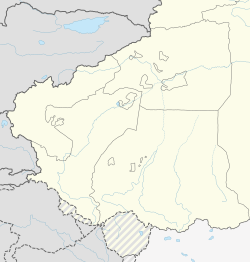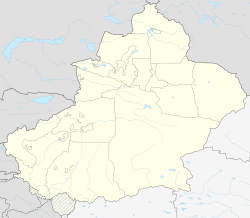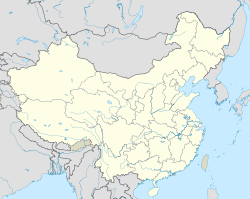Tashkurgan Tajik Autonomous County
Tashkurgan Tajik Autonomous County
| |
|---|---|
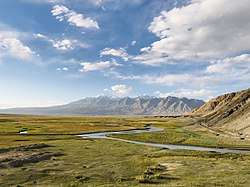 | |
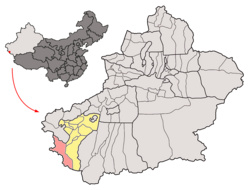 Tashkurgan County (red) in Kashgar Prefecture (yellow) and Xinjiang | |
| Coordinates: 37°46′20″N 75°13′48″E / 37.7721°N 75.2299°E | |
| Country | China |
| Autonomous region | Xinjiang |
| Prefecture | Kashgar |
| County seat | Tashkurgan |
| Township-level divisions | 12[1] |
| Area | |
• Total | 25,000 km2 (10,000 sq mi) |
| Elevation | 3,094 m (10,151 ft) |
| Population (2020)[2] | |
• Total | 39,946 |
| • Density | 1.6/km2 (4.1/sq mi) |
| Ethnic groups | |
| • Major ethnic groups | Tajiks (Pamiris)[1][3] |
| Time zone | UTC+8 (China Standard[a]) |
| Postal code | 845250 |
| Area code | 998 |
| Website | www |
| Tashkurgan Tajik Autonomous County | |||||||||||||||
|---|---|---|---|---|---|---|---|---|---|---|---|---|---|---|---|
 A sign welcoming motorists to Tashkurgan Tajik Autonomous County | |||||||||||||||
| Chinese name | |||||||||||||||
| Simplified Chinese | 塔什库尔干塔吉克自治县 | ||||||||||||||
| Traditional Chinese | 塔什庫爾干塔吉克自治縣 | ||||||||||||||
| Hanyu Pinyin | Tǎshíkù'ěrgān Tǎjíkè Zìzhìxiàn | ||||||||||||||
| |||||||||||||||
| Uyghur name | |||||||||||||||
| Uyghur | تاشقۇرغان تاجىك ئاپتونوم ناھىيىسى | ||||||||||||||
| |||||||||||||||
| Sarikoli name | |||||||||||||||
| Sarikoli | تاشقۈرغان تۇجىك ئافتۇنۇم نايە Toxkhürghon Tujik Oftunum Noya[b] [tɔʃqyrʁɔn tuʤik ɔftunum nɔja] | ||||||||||||||
Tashkurgan Tajik Autonomous County[5][6][7] (often shortened to Tashkurgan County and officially spelled Taxkorgan) is an autonomous county of Kashgar Prefecture, in western Xinjiang, China. The county seat is Tashkurgan. The county is the only Tajik (Pamiri) autonomous county in China.[1]
History
[edit]During the Han dynasty, the town of Tashkurgan was known as Puli (Chinese: 蒲犁; pinyin: Púlí);[8] during the Tang dynasty, it was a protectorate of the Sassanids, during the Yuan dynasty it was part of the Chaghatai empire. It was part of China during the Qing dynasty.
Many centuries later, Tashkurgan became the capital of the Sarikol kingdom (色勒库尔), a kingdom of the Pamir Mountains, and later of Qiepantuo (朅盘陀) under the Persian Empire. At the northeast corner of the town is a huge fortress known as the Princess Castle dating from the Yuan dynasty (1279–1368 CE) and the subject of many colourful local legends. A ruined fire temple is near the fortress.
The region came under Chinese rule from Qing dynasty, to the Republic of China and later on to the People's Republic of China.
On September 17, 1954, Tashkurgan was made an autonomous region (Chinese: 自治区). In February 1955, it was made an autonomous county (Chinese: 自治县).[9]
In 1955, Bulungkol was transferred to Akto County from Tashkurgan County.[10]
In August 2013, the Chinese Academy of Social Sciences announced that they excavated a cluster of Zoroastrian tombs in Tashkurgan.[11]
In May 2017, the county was hit with a magnitude 5.5 earthquake that killed eight and injured 29.[12]
Geography
[edit]Tashkurgan County is located in the eastern part of the Pamir Plateau, where the Kunlun, Karakoram, Hindukush and Tian Shan mountains come together, at the borders with Afghanistan (Wakhan Corridor), Tajikistan (Gorno-Badakhshan Province), Pakistan (Gilgit-Baltistan) and India (Ladakh). The county seat is Tashkurgan Town.
The territorial expanse of the county is 178 kilometres (111 mi) from north to south and 140 kilometres (87 mi) from east to west,[citation needed] the total area is about 25,000 square kilometres (9,700 sq mi),[1] with an average altitude above 4,000 metres (13,000 ft).[1] The county includes a significant part of the Trans-Karakoram Tract, disputed by India and Pakistan in the ongoing Kashmir conflict; while Pakistan and China settled the border issue in 1963, India continues to claim it as part of the state of Jammu and Kashmir.[citation needed]
The Muztagh Ata, at 7,546 metres (24,757 ft), and the Kongur Tagh, at 7,719 metres (25,325 ft), are the main peaks in the county, while the two main rivers are the Tashkurgan River and the Tiznap River.[citation needed] By including the Trans-Karakoram Tract, the county also borders several eight-thousanders, including K2, at 8,611 metres (28,251 ft) the second-highest mountain in the world.[citation needed] There are several hot springs and resources of gold, iron, and copper.[citation needed]
Climate
[edit]Tashkurgan has a cold desert climate (Köppen BWk), influenced by the high elevation, with long, very cold winters, and warm summers. Monthly daily average temperatures range from −11.9 °C (10.6 °F) in January to 16.4 °C (61.5 °F) in July, while the annual mean is 3.58 °C (38.4 °F). An average of only 68 millimetres (2.68 in) of precipitation falls per year
| Climate data for Tashkurgan (1991–2020 normals, extremes 1971–2010) | |||||||||||||
|---|---|---|---|---|---|---|---|---|---|---|---|---|---|
| Month | Jan | Feb | Mar | Apr | May | Jun | Jul | Aug | Sep | Oct | Nov | Dec | Year |
| Record high °C (°F) | 6.5 (43.7) |
12.2 (54.0) |
18.9 (66.0) |
22.0 (71.6) |
25.1 (77.2) |
31.0 (87.8) |
32.5 (90.5) |
31.4 (88.5) |
27.8 (82.0) |
22.7 (72.9) |
14.3 (57.7) |
10.5 (50.9) |
32.5 (90.5) |
| Mean daily maximum °C (°F) | −4.1 (24.6) |
0.3 (32.5) |
7.4 (45.3) |
13.3 (55.9) |
17.4 (63.3) |
20.9 (69.6) |
24.1 (75.4) |
23.3 (73.9) |
19.2 (66.6) |
12.2 (54.0) |
5.7 (42.3) |
−1.3 (29.7) |
11.5 (52.8) |
| Daily mean °C (°F) | −11.8 (10.8) |
−6.8 (19.8) |
0.7 (33.3) |
6.6 (43.9) |
10.4 (50.7) |
13.8 (56.8) |
16.8 (62.2) |
16.1 (61.0) |
11.9 (53.4) |
4.7 (40.5) |
−2.3 (27.9) |
−9.2 (15.4) |
4.2 (39.6) |
| Mean daily minimum °C (°F) | −18.6 (−1.5) |
−13.9 (7.0) |
−6.3 (20.7) |
−0.2 (31.6) |
3.7 (38.7) |
7.1 (44.8) |
9.9 (49.8) |
9.4 (48.9) |
4.1 (39.4) |
−3.1 (26.4) |
−9.6 (14.7) |
−15.9 (3.4) |
−2.8 (27.0) |
| Record low °C (°F) | −40.1 (−40.2) |
−36.0 (−32.8) |
−25.7 (−14.3) |
−11.5 (11.3) |
−5.6 (21.9) |
−1.0 (30.2) |
2.2 (36.0) |
−0.2 (31.6) |
−5.0 (23.0) |
−12.2 (10.0) |
−23.3 (−9.9) |
−31.5 (−24.7) |
−40.1 (−40.2) |
| Average precipitation mm (inches) | 2.7 (0.11) |
3.5 (0.14) |
3.2 (0.13) |
5.3 (0.21) |
11.7 (0.46) |
19.7 (0.78) |
13.6 (0.54) |
12.7 (0.50) |
7.8 (0.31) |
2.1 (0.08) |
0.8 (0.03) |
2.3 (0.09) |
85.4 (3.38) |
| Average precipitation days (≥ 0.1 mm) | 2.4 | 2.5 | 2.3 | 2.8 | 5.9 | 7.6 | 6.8 | 6.3 | 2.9 | 1.9 | 0.4 | 1.4 | 43.2 |
| Average snowy days | 3.6 | 3.7 | 4.7 | 4.8 | 3.1 | 0.5 | 0 | 0 | 0.4 | 2.8 | 1.3 | 2.0 | 26.9 |
| Average relative humidity (%) | 52 | 46 | 36 | 33 | 37 | 41 | 40 | 42 | 41 | 38 | 40 | 47 | 41 |
| Mean monthly sunshine hours | 174.9 | 171.1 | 229.6 | 258.9 | 282.3 | 296.3 | 314.2 | 285.2 | 269.8 | 254.6 | 212.3 | 181.1 | 2,930.3 |
| Percent possible sunshine | 57 | 55 | 61 | 65 | 64 | 67 | 71 | 69 | 74 | 75 | 71 | 61 | 66 |
| Source 1: China Meteorological Administration[13][14] | |||||||||||||
| Source 2: Weather China[15] | |||||||||||||
Administrative divisions
[edit]The county administers 2 towns, 9 townships and 1 ethnic township, which then administer 50 village-level divisions.[1]
| Name[10]: 234–236 | Sarikoli (Uyghur Arabic) |
Sarikoli (in IPA) |
Uyghur (Erep Yeziⱪi) |
Uyghur (Siril Yezik) |
Uyghur (Yenɡi Yeziⱪ) |
Chinese (Simplified)[1][16][17] | Pinyin |
|---|---|---|---|---|---|---|---|
| Tashkurgan Town | تاشقۈرغان بۇزۇر | tɔʃqyrʁɔn buzur | تاشقۇرغان بازىرى | Ташқурған базири | Taxⱪurƣan baziri | 塔什库尔干镇 | Tǎshíkù’ěrgān Zhèn |
| Tajik Abat | تۇجىك ئاباد بۇزۇر | tudʒikobod buzur | تاجىك ئابات بازىرى | Таҗик Абaт базири | Tajik Abat baziri | 塔吉克阿巴提镇 | Tǎjíkè Ābātí Zhèn |
| Tashkurgan Township | تاشقۈرغان دىيۇر | tɔʃqyrʁɔn diyur | تاشقۇرغان يېزىسى | Ташқурған йәзиси | Taxⱪurƣan yezisi | 塔什库尔干乡 | Tǎshíkù’ěrgān Xiāng |
| Tagarma Township | تەغەرمى دىيۇر | taʁarmi diyur | تاغارما يېزىسى | Тағарма йәзиси | Taƣarma yezisi | 塔合曼乡 | Tǎhémàn Xiāng |
| Tiznap Township | تىزنېف دىيۇر | tiznef diyur | تىزناپ يېزىسى | Тизнап йәзиси | Tiznap yezisi | 提孜那甫乡 | Tízīnàfǔ Xiāng |
| Dafdar Township | ذەۋذار دىيۇر | ðavðɔr diyur | دەفتەر يېزىسى | Дәфтәр йәзиси | Defter yezisi | 达布达尔乡 | Dábùdá’ěr Xiāng |
| Weqa Township | ۋەچە دىيۇر | watʃa diyur | ۋەچە يېزىسى | Вәчә йәзиси | Weqe yezisi | 瓦恰乡 | Wǎqià Xiāng |
| Baldir Township | بەلدىر دىيۇر | baldir diyur | بەلدىر يېزىسى | Балдир йәзиси | Baldir yezisi | 班迪尔乡 | Bāndí’ěr Xiāng |
| Maryang Township | مەرياڭ دىيۇر | marjɔŋ diyur | مارياڭ يېزىسى | Маряң йәзиси | Maryang yezisi | 马尔洋乡 | Mǎ'ěryáng Xiāng |
| Datong Township | تۈڭ دىيۇر | tyŋ diyur | داتۇڭ يېزىسى | Датуң йәзиси | Datung yezisi | 大同乡 | Dàtóng Xiāng |
| Koguxluk Township | قۇغۇشلۇغ دىيۇر | quʁuʃluʁ diyur | قوغۇشلۇق يېزىسى | Қоғухлуқ йәзиси | Ⱪoƣuxluⱪ yezisi | 库科西鲁格乡 | Kùkēxīlǔgé Xiāng |
| Kokyar Kyrgyz Township1 | کاکيەر قىرغىز مىلى دىيۇر | kɔkjar qirʁiz mili diyur | كۆكيار قىرغىز مىللىي يېزىسى | Көкяр Қирғиз миллий йәзиси | Kɵkyar Ⱪirƣiz milliy yezisi | 科克亚尔柯尔克孜族乡 | Kēkèyà’ěr Kē’ěrkèzīzú xiāng |
- Mazar sheep breeding farm (麻扎尔种羊场)
- Buhoi Jirap farm (布候依吉拉甫农场))
- Dairy farm (牛奶场)
- Bazadax forest farm(巴扎达什牧林场)
Notes
- Official Kyrgyz name of Kokyar Kyrgyz Township: كۅكجار قىرعىز ۇلۇتتۇق ايىلى (Көкжар Кыргыз улуттуқ айылы / Kökcar Kyrgyz ayyly)
Demographics
[edit]| Year | Pop. | ±% p.a. |
|---|---|---|
| 1995 | 27,800 | — |
| 2000 | 30,454 | +1.84% |
| 2010 | 37,843 | +2.20% |
| [18] | ||
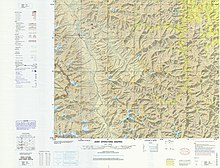
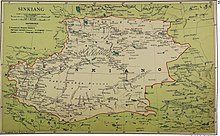


As of 2018, Tashkurgan County had a population of 40,999,[19] up slightly from the 40,381 reported in 2015,[20] and the 37,843 counted in the 2010 Chinese census.[18]
Ethnic composition
[edit]| Ethnic group | 2015[20] | 2018[19] | ||
|---|---|---|---|---|
| Mountain Tajiks | 32,867 | 81.39% | 33,718 | 82.24% |
| Han Chinese | 2,911 | 7.21% | 2,690 | 6.56% |
| Kyrgyz | 2,320 | 5.75% | 2,369 | 5.78% |
| Uyghur | 2,179 | 5.40% | 2,131 | 5.20% |
| Hui | 30 | 0.07% | 29 | 0.07% |
| Kazakh | 15 | 0.04% | 15 | 0.04% |
| Manchu | 9 | 0.02% | 6 | 0.01% |
| Mongol | 9 | 0.02% | 6 | 0.01% |
| Sibe | 7 | 0.02% | 6 | 0.01% |
| Russian | 1 | < 0.01% | 0 | 0.00% |
| Others | 33 | 0.08% | 29 | 0.07% |
| Total | 40,381 | 100.00% | 40,999 | 100.00% |
Mountain Tajiks make up a supermajority of the county's population, with recent figures indicating they make up somewhere from 80.9% of the population,[1] to 82.24%.[19] Other prominent ethnic groups include the Han Chinese, the Kyrgyz, and Uyghurs.[19][20]
In 1999, 6.28% of the population of Tashkurgan County was Han Chinese and 5.08% of the population was Uyghur.[21]
In 1995, the total population of Tashkurgan was 27,800, among them 84% Tajiks of Xinjiang, who speak the Sarikoli language, 4% Han and 12% other nationalities.[citation needed]
Economy
[edit]Animal husbandry is the primary economic mode with agriculture. The well-known Dunbashi fat-tailed sheep (敦巴什大尾羊) are raised in the county as well as domestic yaks. Agricultural products include highland barley, wheat, and others. Mineral resources include iron, sulfur, and asbestos.[9] In 2011, the county was considered relatively poor. 90% of the residents were engaged in animal husbandry.[22]
The annual per capita disposable income 2018 totaled ¥29,053 for the county's urban residents, and ¥7,630 for the county's rural residents.[1] These figures increased 6.7% and 10.2%, respectively, from 2017.[1]
In 2019, the county government reported that the county has 17 impoverished villages, and 893 households with 3682 people in poverty.[1]
Transportation
[edit]The county is served by Karakoram Highway, which runs through Tashkurgan.[23] As of September 2016, China has begun building an elevated road[further explanation needed] which is expected to be completed in a few years.[citation needed] Tashkurgan Khunjerab Airport is now under construction and will be in service in 2022.[24]
See also
[edit]- Afghanistan–China border
- Chalachigu Valley
- China–Tajikistan border
- Shaksgam River
- Taghdumbash Pamir
- Tashkurgan Nature Reserve
- Yarkand River
Notes
[edit]- ^ Locals in Xinjiang frequently observe UTC+6 (Xinjiang Time), 2 hours behind Beijing.
- ^ There is no official orthography for Sarikoli in China. This is the spelling used in the Sarikoli-Chinese dictionary written by linguist Gao Erqiang.[4]
References
[edit]- ^ a b c d e f g h i j k l 塔县政府办公室 (2019-12-15). 塔什库尔干塔吉克自治县基本概况 [Tashkurgan Tajik Autonomous County Basic Overview]. 塔什库尔干政府门户网站 (in Simplified Chinese). Archived from the original on 2020-02-09. Retrieved 2020-02-09.
全县总面积2.5万平方公里,辖12个乡镇50个村(社区),总人口4.1万人,塔吉克族占80.9%,是全国唯一的塔吉克民族自治县,外与巴基斯坦、阿富汗、塔吉克斯坦及克什米尔地区接壤,边境线长793.6公里,
- ^ Xinjiang: Prefectures, Cities, Districts and Counties
- ^ 壮阔之美●新疆帕米尔高原. 塔什库尔干政府门户网站 (in Simplified Chinese). 24 December 2018. Retrieved 9 February 2020.
主要居民为塔吉克族。
- ^ Gao, Erqiang (高尔锵) (1996). 塔吉克汉词典 [Tajik-Chinese Dictionary] (in Simplified Chinese). Sichuan Nationalities Publishing House (四川民族出版社). ISBN 978-7-5409-1744-9.
- ^ 中国地名委员会 (1994). 《中华人民共和国地名录》. Beijing: 中国社会出版社. p. 706.
- ^ 崔乃夫 (Cui Naifu). 中华人民共和国分省地图集. p. 122.
- ^ 《中华人民共和国地名大词典》. Beijing: The Commercial Press. 2002. p. 6534.
- ^ See the discussions in Hill, John E. (2009) Through the Jade Gate to Rome: A Study of the Silk Routes during the Later Han Dynasty, 1st to 2nd Centuries CE. BookSurge, Charleston, South Carolina. ISBN 978-1-4392-2134-1, Note 20.2, pp. 394-401.
- ^ a b 夏征农; 陈至立, eds. (September 2009). 辞海:第六版彩图本 [Cihai (Sixth Edition in Color)] (in Chinese). 上海. Shanghai: 上海辞书出版社. Shanghai Lexicographical Publishing House. p. 2189. ISBN 9787532628599.
- ^ a b Xie Yuzhong 解玉忠 (2003). 地名中的新疆 (in Simplified Chinese). Ürümqi: Xinjiang People's Press. p. 193. ISBN 7-228-08004-1.
- ^ "Zoroastrian Cemetery found in Xinjiang, Tashkurgan Tajik Autonomous County, Jirzankal, 2013". kaogu.cn. Translated by Grace Warren. Institute of Archaeology, Chinese Academy of Social Sciences. 26 October 2013. Retrieved 21 January 2020.
- ^ Zhang, Dongmiao (2017-05-12). "8 dead, 29 injured in Xinjiang's 5.5-magnitude earthquake". www.xinhuanet.com. Xinhua News Agency. Archived from the original on 2021-06-10. Retrieved 2021-06-10.
- ^ 中国气象数据网 – WeatherBk Data (in Simplified Chinese). China Meteorological Administration. Retrieved 10 October 2023.
- ^ "Experience Template" 中国气象数据网 (in Simplified Chinese). China Meteorological Administration. Retrieved 10 October 2023.
- ^ 塔什库尔干 – 气象数据 -中国天气网 (in Chinese). Weather China. Retrieved 29 November 2022.
- ^ 家乡“塔什库尔干县”微名片. 塔什库尔干政府门户网站 (in Simplified Chinese). 24 December 2018. Archived from the original on 19 April 2020. Retrieved 20 April 2020.
塔什库尔干自治县辖1镇、10乡、1场:塔什库尔干镇、塔什库尔干乡、提孜那甫乡、塔合曼乡、柯克亚柯尔克孜民族乡、达布达尔乡、库克西力克乡、班迪尔乡、瓦恰乡、马尔洋乡、大同乡、麻扎种羊场。
- ^ 2018年统计用区划代码和城乡划分代码:塔什库尔干塔吉克自治县 (in Simplified Chinese). National Bureau of Statistics of the People's Republic of China. 2018. Retrieved 9 February 2020.
统计用区划代码 名称 653131100000 塔什库尔干镇 653131101000 塔吉克阿巴提镇 653131200000 塔什库尔干乡 653131201000 塔合曼乡 653131202000 科克亚尔柯尔克孜族乡 653131203000 提孜那甫乡 653131204000 达布达尔乡 653131205000 马尔洋乡 653131206000 瓦恰乡 653131207000 班迪尔乡 653131208000 库科西鲁格乡 653131210000 大同乡
- ^ a b 塔什库尔干县历史沿革 [Tashkurgan County Historical Evolution]. XZQH.org (in Simplified Chinese). 14 November 2014. Retrieved 11 May 2020.
2000年第五次人口普查,塔什库尔干塔吉克自治县常住总人口30454人{...}2010年第六次人口普查,塔什库尔干塔吉克自治县常住总人口37843人
- ^ a b c d 3-7 各地、州、市、县(市)分民族人口数 [3-7 Population by Nationality by Prefecture, Prefecture, City and County (City)] (in Chinese). Statistical Bureau of Xinjiang Uygur Autonomous Region. 2020-06-10. Archived from the original on 2020-11-01. Retrieved 2021-06-10.
- ^ a b c 3-7 各地、州、市、县(市)分民族人口数 [3-7 Population by Nationality by Prefecture, Prefecture, City and County (City)] (in Simplified Chinese). شىنجاڭ ئۇيغۇر ئاپتونوم رايونى 新疆维吾尔自治区统计局 Statistic Bureau of Xinjiang Uygur Autonomous Region. 2017-03-15. Archived from the original on 2017-10-11. Retrieved 2021-06-10.
- ^ Morris Rossabi, ed. (2004). Governing China's Multiethnic Frontiers (PDF). University of Washington Press. p. 179. ISBN 0-295-98390-6.
- ^ "The mountainous task of getting to school". China Daily. 30 September 2011. Retrieved 20 April 2020.
- ^ 塔什库尔干县召开314国道项目复工复产达产现场推进会 [Tashkurgan County held a site promotion meeting for the resumption of production and production of the 314 National Highway project]. www.tskeg.gov.cn (in Chinese). Tashkurgan Tajik Autonomous County People's Government. 2020-04-18. Archived from the original on 2020-06-06. Retrieved 2021-06-10.
- ^ 张涵. "In pics: construction site of Tashkurgan Airport in Xinjiang - Xinhua | English.news.cn". www.xinhuanet.com. Archived from the original on October 29, 2020. Retrieved 2020-10-26.

